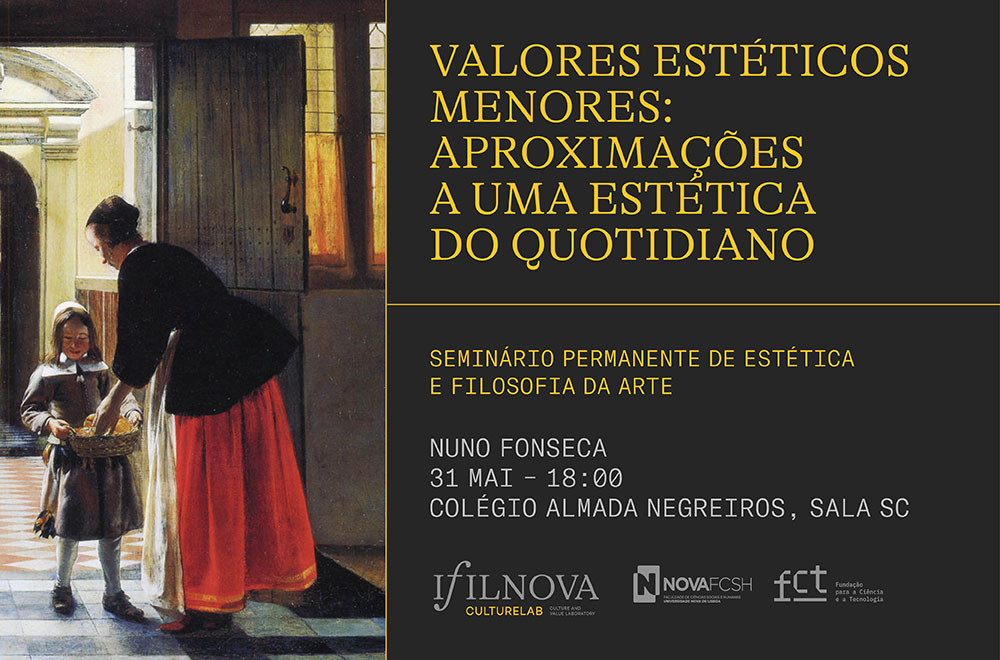Minor aesthetic values: approaches to an aesthetics of everyday life

“I doubt I’m very much mistaken if I dare to say that we need only open our eyes and look around carefully to see valuable things, if we look at them closely enough and with a certain degree of attention”, said the Swiss writer Robert Walser in a short text entitled “Ash, needle, pencil and match” (New York Review of Books, 2016). In this text, Walser was talking precisely about the smallest, humblest, most banal, and almost insignificant things, those which surround us and inhabit our daily lives. Leaving aside the writer’s microscriptural prose idiosyncrasies, it is not so difficult to find – in literature, in poetry or in the arts in general – this kind of look, this kind of attention towards the minutiae of everyday subjects, to encounter several creative gestures that disclose banal objects, events and the circumstances of the common, of the ordinary, of that which is so familiar and expected that we do not even notice it. It would probably be enough to recall Dutch genre painting, some still lifes, Georges Perec’s prose on the “infra-ordinary”, Chantal Akerman’s films, numerous documentaries, but also graphic novels and various works and performances by contemporary artists, in order to understand that the small things of everyday life often nourish the inspiration of those artists, writers or even musicians. And it would perhaps be a mistake to think that artists only unveil or are inspired by the values of the beautiful, the sublime, or even the tragic and the comic found in everyday life, which is to say, the classical aesthetic values of the Western tradition. There is a whole series of aesthetic values, which we might classify as minor, which permeate our everyday experience and which also arouse the attention and feelings of authors and artists. In fact, some of them often take the place of classical values not only in contemporary creation, but also in our everyday urban experience, a realm where we basically live most of our aesthetic experiences: the interesting, the fun, the kitsch, the cute and the dainty, the unheimlich (strangely familiar), the sexy or erotic, the pretty, the decorative and the agreeable, the serene and the soothing, the terrible and the obscene, or even the grotesque and the boring, etc.
This presentation intends, not only to reflect on some of these minor aesthetic values, but also to encourage reflection on the pertinence and validity of what has been called “everyday aesthetics” and which might be, for some, a recent expansion of the traditional domain of philosophical aesthetics – although anticipated by some less orthodox authors in the history of philosophy such as Georg Simmel, Walter Benjamin, Henri Lefebvre or Michel de Certeau – and, for others, essentially a return to the origins of modern aesthetic thought in the 17th and 18th centuries, before the broad scope of this science of sensitive knowledge, this “lower gnoseology”, was reduced in practice to that of the philosophy of art.
The session will be in Portuguese. To join the session on Zoom, click here.
Bio
Nuno Fonseca (b. 1974) is currently an integrated researcher at the NOVA Institute of Philosophy (IFILNOVA) and, within the Culturelab, coordinates the “Aesthetics and Philosophy of Art” research group. He investigates various topics in Aesthetics and Philosophy of Art (experience, concepts and aesthetic values) both in the context of the arts, where he focuses mainly on sound art, and in the context of urban space and everyday life. At the same time, he continues his research on the “Port-Royal’s Logic”, being the author of its first Portuguese translation.
He has taught, at NOVA FCSH, the course “Rhetoric and Argumentation” (2012–2014), of the Communication Sciences department, the seminar “Art and Experience” (2012–2013), in the scope of the MA in Aesthetics, and several short courses on the Philosophy of Sounds and Sound Arts (2015–2018), as well as modules dedicated to Logic, Epistemology and Aesthetics. Since 2021, he co-teaches the course “Urban Aesthetics: Philosophy, Art and the City”, offered in the international curriculum of the faculty.
With a degree in Law (1998) and Philosophy (2004) from the University of Coimbra, he completed his PhD in Philosophy (Epistemology and Philosophy of Knowledge) at NOVA FCSH in 2012, working on issues related to mental and pictorial representation and perception.
Besides other national and international publications, he has co-edited the volumes Morphology: Questions on Method and Language (2013), Conceptual Figures of Fragmentation and Reconfiguration (2021), Planos de pormenor (2023), A cidade nas práticas artísticas (2023) and is preparing a collective book Rethinking the City: Reconfiguration and Fragmentation to be published at Routledge during 2024.

